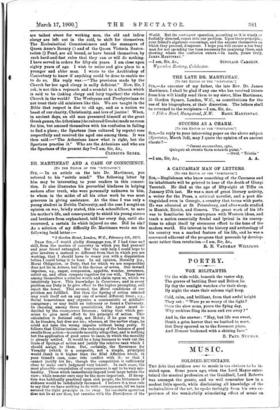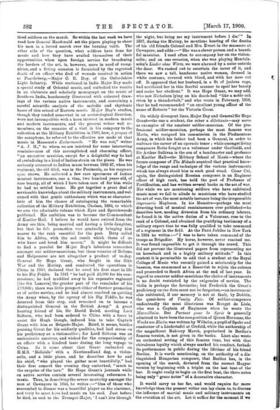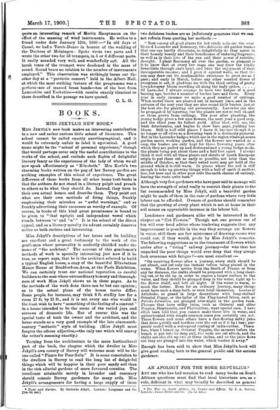MUSIC •
SOLDIER-MUSICIANS.
THE debt that soldiers owe to music is too obvious to be in- sisted upon. Some years ago, when the Lord Mayor enter- tained the musical profession at the Guildhall, Lord Roberts was amongst the guests, and we well remember how in a modest little speech, while disclaiming all knowledge of the technicalities of the art, he spoke feelingly from his own ex- perience of the wonderfully stimulating effect of music on tired soldiers on the march. Bo within the last week we have read how General Macdonald set the pipers playing to cheer his men in a forced march over the burning veldt. The other side of the question, what soldiers have done for music and how they have availed themselves of their opportunities when upon foreign service for broadening the borders of the art, is, however, more in need of recog- nition, and a fitting occasion is furnished by the regretted death of an officer who died of wounds received in action at Paardeberg,--Major C. R. Day, of the Oxfordshire Light Infantry. While stationed in India Major Day made a special study of Oriental music, and embodied the results in an elaborate and scholarly monograph on the music of Southern India, handsomely illustrated with coloured draw- ings of the various native instruments, and containing a careful scientific analysis of the melodic and rhythmic bases of this school of Eastern music. Major Day's studies, though they tended somewhat in an archeological direction, were not incompatible with a keen interest in modern music and modern instruments, and the present writer well re- members, on the occasion of a visit in his company to the collection at the Military Exhibition in 1890, how, it propos of the saxophone, he referred to the effective use made of that music in Massenet's Esclarmonde. " He was not," writes "A. J. H.," to whom we are indebted for some interesting reminiscences of this accomplished and charming officer, "an executive musician, except for a delightful way he had of preludising in a kind of Indian strain on the piano. He was seriously attracted to Indian music between 1882-87, when his regiment, the old 43rd, was in the Peninsula, as his magnum opus shows. He collected a few rare specimens of Indian musical instruments, one a vina, two hundred years old, of rare beauty, all of which I have taken care of for him while he had no settled home. He got together a great deal of serviceable knowledge about the military instruments, and wel- comed with that gentle enthusiasm which was so character- istic of him the chance of cataloguing the remarkable collection of the Military Exhibition, Chelsea, 1890, to which we owe the admirable volume which Eyre and Spottiswoode published. His ambition was to become the Commandant of Kneller HalL I believe he would have retired from the Army ere this, being married and having a little daughter, but that he felt promotion was gradually bringing him nearer to the rank essential for the post. Duty called him to Africa, with the sad result which those of us who knew and loved him mourn." It might be difficult to find a parallel for Major Day's laborious researches amongst our soldier-musicians, but these votaries of Bellows, and Melpomene are not altogether a product of to-day. General Sir Hope Grant, who fought in the Sikh War and the Mutiny, and conducted the operations in China in 1860, declared that he owed his first start in life to his Big Fiddle. In 1841 "he had paid £5,000 for his com- missions; he had muddled away in his expensive regiment [the 9th Lancers] the greater part of the remainder of his £10,000; there was little prospect either of further promotion or of active service, and he had almost resolved on quitting the Army when, by the agency of his Big Fiddle, he was deterred from this step, and remained on to become a distinguished General in the British Army." A great hunting friend of his, Sir David Baird, meeting Lord Saltoun, who had been ordered to China with a force to assist Sir Hugh Gough, induced him to take Captain Grant with him as Brigade-Major. Baird, it seems, besides praising Grant for his soldierly qualities, had laid stress on his proficiency as a violoncellist; for Lord Saltoun was an enthusiastic amateur, and wished for the companionship of an officer with a kindred taste during the long voyage to China. So it came about that Grant embarked on H.M.S. • Belleisle ' with a Newfoundland dog, a violon- cello, and a little piano, and he describes how be and his chief, "who played the guitar most beautifully," had their first concert the evening they embarked, "much to the surprise of the tars." Sir Hope Grant's journals while on active service contain several interesting references to music. Thus, in describing the severe mortality amongst the men at Cawnpore in 1844, he writes :—" One of those who succumbed to disease was a beautiful player on the clarionet, and truly he must have had music on his soul. Just before be died, he said to the Trumpet-Major, `I can't live through the night, but bring me my instrument before I die.' " In 1857, during the Mutiny, he mentions hearing of the deaths of his old friends Colonel and Mrs. E wart in the massacre at Oawnpore, and adds :—" She was a clever person and a beauti- ful musician. I used often to accompany her on the violon- cello; and on one occasion, when she was playing Mendels- sohn's Lieder ohne Porte, we were alarmed by a noise outside the door. We rushed out to ascertain the cause of it, and there we saw a tall, handsome native woman, dressed in white costume, covered with blood, and with her nose cut off. It appeared that her husband, in a fit of jealous rage, had mutilated her in this fearful manner to spoil her beauty and make her obedient." It was Hope Grant, we may add, who saw Nicholson lying on his death-bed "like a noble oak riven by a thunderbolt," and who wrote in February, 1858, that he had recommended " an excellent young officer of the name of Roberts" for the Victoria Cross.
On widely divergent lines, Major Day and General Sir Hope Grant—the one a student, the other a dilettante—may serve as examples of the amateur soldier-musician. Of the pro- fessional soldier-musician, perhaps the most famous was Mario, who resigned his commission in the Piedmontese Army, in which his father had been a General, in order to embrace the career of an operatic tenor ; while amongst living composers BoIto fought as a volunteer under Garibaldi, and Sir Arthur Sullivan is the son of a bandmaster and professor at Kneller Hall—the Military School of Music—where the future composer of The Mikado acquired that practical know- ledge of the range and technique of the various instruments which has always stood him in such good stead. Cesar Ciii, again, the distinguished Russian composer. is an Engineer officer of high rank, has held the post of Professor of Fortification, and has written several books an the art of war. Nor while we are mentioning soldiers who have cultivated music must we fail to allude to musicians who have studied the art of war, the most notable instance being the irrepressible impresario Mapleson. In hie Memoirs—perhaps the most diverting book of musical reminiscences ever published—he describes how, needing diversion from his ordinary labours, he found it in the active duties of a Volunteer, rose to the rank of a Colonel, and obtained the gratifying testimony of a military expert that he was fully qualified to take command of a regiment in the field. At the Patti Jubilee in New York in 1884 he writes :—" I was to have taken command of the troops as Brigadier. My horse, however, never reached me. It was found impossible to get it through the crowd. This did not prevent the illustrated papers from representing me on horseback and in a highly military attitude?' In this context it is permissible to add that a student at the Royal College of Music who recently gained a scholarship for the bassoon, was summoned as a Reservist to rejoin the colours and proceeded to South Africa at the end of last year. In regard to amateur soldier-musicians the choice of instruments is no doubt restricted by the exigencies of service. The violin is perhaps the favourite; but Frederick the Great's proficiency on the flute must not be forgotten,—an instrument also cultivated, if our memory is not at fault, by Dobbin, the quasi-hero of Vanity Fair. Of soldier-composers undoubtedly the most illustrious was Ronget de Lisle, who was a Captain of Engineers when he wrote the farseillaise. Bnt Partant pour la Syrie is generally admitted to have been the composition of Queen Hortense, the [Yacht ant Rhein was written by Wilhelm, a pupil of Spohr and conductor of a Liedertafel at Crefeld, while the authorship of the magnificent Rakoczy March, popularised in Berlioz's famous version, is not given in the books. Liszt also wrote an orchestral setting of this famous tune, but with that chivalrous loyalty which always marked his conduct, forbade its performance in public during the lifetime of his friend Berlioz. It is worth mentioning, on the authority of a dis- tinguished Hungarian composer, that Berlioz has, in the opening of the march, deviated from the correct Magyar version by beginning with a triplet on the last beat of the bar. It ought really to begin on the first beat, the three notes being only '' grace notes" of a decorative character.
It would carry us too far, and would require far more knowledge than the present writer can lay claim to, to discuss the influence of martial music and military instruments on the evolution of the art. Let it suffice for the moment if we
quote an interesting remark of Moritz Hauptmaun on the effect of the massing of wind instruments. He writes to a friend under date January 12th, 1860 :—" In old days at Cassel, we had a Torch-Dance in honour of the wedding of the Duchess of Meiningen : Spohr wrote two parts and I wrote the other two for 53 trumpets, in 5 or 6 different parts. It really sounded very well, and wonderfully soft. All the harsh tones of the trumpet were deadened in the mass of sound. Sound bears no relation to the number of instruments employed." This observation was strikingly borne out the other day at a "patriotic concert" held in the Albert Hall, at which the most striking feature of the programme was a performance of massed brass bands—ten of the best from Lancashire and Yorkshire—with results exactly identical to those described in the passage we have quoted.
C. L. G.


































 Previous page
Previous page